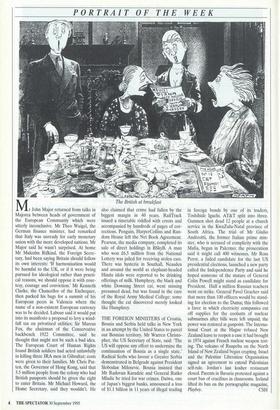PORTRAIT OF THE WEEK
The British at breakfast Mr John Major returned from talks in Majorca between heads of government of the European Community which were utterly inconclusive. Mr Theo Waigel, the German finance minister, had remarked that Italy was unready for early monetary union with the more developed nations. Mr Major said he wasn't surprised. At home Mr Malcolm Rifkind, the Foreign Secre- tary, had been saying Britain should follow its own interests: 'If harmonisation would be harmful to the UK, or if it were being pursued for ideological rather than practi- cal reasons, we should oppose it with cour- tesy, courage and conviction.' Mr Kenneth Clarke, the Chancellor of the Exchequer, then packed his bags for a summit of his European peers in Valencia where the name of a non-existent European currency was to be decided. Labour said it would put into its manifesto a proposal to levy a wind- fall tax on privatised utilities; Sir Marcus Fox, the chairman of the Conservative backbench 1922 Committee, said he thought that might not be such a bad idea. The European Court of Human Rights found British soldiers had acted unlawfully in killing three IRA men in Gibraltar; costs were given to their families. Mr Chris Pat- ten, the Governor of Hong Kong, said that 3.5 million people from the colony who had British passports should be given the right to enter Britain. Mr Michael Howard, the Home Secretary, said they wouldn't. He also claimed that crime had fallen by the biggest margin in 40 years. RailTrack issued a timetable riddled with errors and accompanied by hundreds of pages of cor- rections. Penguin, HarperCollins and Ran- dom House left the Net Book Agreement. Pearson, the media company, completed its sale of direct holdings in BSkyB. A man who won £6.5 million from the National Lottery was jailed for receiving stolen cars. There was hysteria in Southall, Neasden and around the world as elephant-headed Hindu idols were reported to be drinking offerings of milk. Humphrey, the black and white Downing Street cat, went missing presumed dead, but was found in the care of the Royal Army Medical College; some thought the cat discovered merely looked like Humphrey.
THE FOREIGN MINISTERS of Croatia, Bosnia and Serbia held talks in New York in an attempt by the United States to parcel out Bosnian territory. Mr Warren Christo- pher, the US Secretary of State, said: 'The US will oppose any effort to undermine the continuation of Bosnia as a single state.' Radical Serbs who favour a Greater Serbia demonstrated in Belgrade against President Slobodan Milosevic. Bosnia insisted that Mr Radovan Karadzic and General Ratko Mladic be tried for war crimes. Daiwa, one of Japan's biggest banks, announced a loss of $1.1 billion in 11 years of illegal trading in foreign bonds by one of its traders, Toshihide Iguchi. AT&T split into three. Gunmen shot dead 12 people at a church service in the KwaZulu-Natal province of South Africa. The trial of Mr Giulio Andreotti, the former Italian prime min- ster, who is accused of complicity with the Mafia, began in Palermo; the prosecution said it might call 400 witnesses. Mr Ross Perot, a failed candidate for the last US presidential elections, launched a new party called the Independence Party and said he hoped someone of the stature of General Colin Powell might stand as candidate for President. Half a million Russian teachers went on strike. General Pavel Grachev said that more than 100 officers would be stand- ing for election to the Duma; this followed a farce in which electricity companies cut off supplies for the coolants of nuclear submarines after bills were left unpaid; the power was restored at gunpoint. The Interna- tional Court at the Hague refused New Zealand leave to reopen a case it had brought in 1974 against French nuclear weapon test- ing. The volcano of Ruapehu on the North Island of New Zealand began erupting. Israel and the Palestine Liberation Organisation signed an agreement to extend Palestinian self-rule. Jordan's last kosher restaurant closed. Parents in Bavaria protested against a court ban of crucifixes in classrooms. Ireland lifted its ban on the pornographic magazine,


































































 Previous page
Previous page